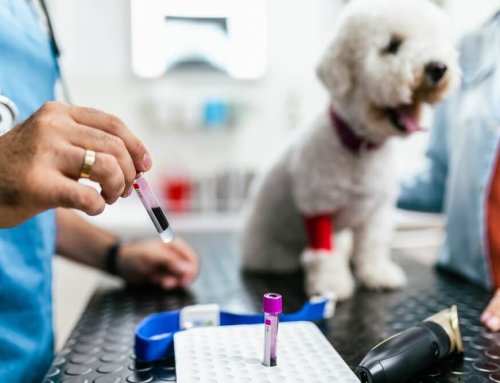Pets can experience disabilities that impair their ability to participate and engage in daily activities. Specially-abled pets make excellent companions, but they require additional care and attention. Our 360 Pet Medical team wants to help by providing information about how to care for your specially-abled pet to ensure their life is fulfilling.
Caring for mobility-impaired pets
Conditions such as intervertebral disc disease, spinal trauma, neuromuscular disorders, endocrine problems, and brain tumors can impaired pets’ mobility. These issues most commonly affect the hind limbs, but sometimes involve all four limbs. Recommendations to care for your mobility-impaired pet include:
- Maintaining your pet at a healthy weight — Carrying excess weight puts additional strain on the joints and limbs of a pet with mobility problems. Calculate your pet’s daily energy requirements and feed them appropriately to help prevent weight gain. In addition, weigh them every three to four weeks to ensure they are maintaining a healthy weight, so you can adjust their diet if necessary.
- Providing appropriate bedding — Mobility impaired pets spend a lot of time lying down, so ensure their bedding is thick enough and supportive enough to prevent bedsores. In addition, clean the bedding frequently to prevent infection.
- Ensuring your pet has access to food and water — Staying hydrated is important for all pets. Ensure your special pet can easily access water at all times, and that they can remain upright when they eat, to prevent food aspiration and aspiration pneumonia.
- Assisting your pet when eliminating — You may have to hold your pet while they urinate and defecate, and you may also need to express their bladder or catheterize them several times a day if their condition affects their ability to urinate. Some mobility-impaired pets also have difficulty moving their bowels, and you may need to feed a high fiber diet to help prevent constipation.
- Keeping your pet clean — Accidents are inevitable, and if your pet soils themselves, clean them as soon as possible to help prevent skin irritation and infection.
- Arranging physical therapy — Most mobility-impaired pets benefit from physical therapy exercises to improve muscle tone and circulation.
- Making your home slip proof — Placing slip-proof mats and rugs throughout your home will help prevent an accident because of slippery floors.
- Keeping your pet mobile — Use a sling or a well-fitted cart or wheelchair to help keep your pet mobile.
- Interacting with your pet — Your pet needs attention and love to stay mentally engaged, so ensure you spend time with them daily.
Caring for blind pets
Conditions such as cataracts, glaucoma, retinal degeneration, and eye infection or trauma can cause blindness in pets. Typically, pets adjust well to vision deficits, especially if the loss is gradual. Recommendations to care for your blind pet include:
- Keeping their environment consistent — Blind pets learn to navigate their home by mind mapping their surroundings, and rearranging your furniture will confuse them. In addition, keep their food and water bowls in a stable location, and your cat’s litter box in the same spot.
- Keeping your home clutter free — Ensure your floor is clutter free to avoid tripping hazards.
- Choosing the same route — On outings, always take your pet on the same route so they know where they are and don’t feel nervous.
- Speaking to your pet — Talk to your pet frequently so they can monitor your movements, and speak before you touch them to avoid startling them.
- Staying in a routine — Blind pets feel more comfortable and secure when they know what to expect each day.
- Allowing your pet to acclimate — You may feel that you should carry your pet everywhere, but they will do better if you let them acclimate to their situation.
- Alerting others — Ensure friends, family members, and anyone else who approaches your pet know they are blind, so they announce their presence and your pet is not startled.
- Ensuring your cat remains inside — Cats can encounter dangers such as busy streets and predators when outside, and blind cats especially are unable to protect themselves from these hazards.
Caring for deaf pets

Conditions including birth defects, chronic ear infections, trauma, and aging changes can lead to deafness in pets. Recommendations to care for your deaf pet include:
- Leashing your pet — On outings, keep your pet leashed at all times to prevent traffic accidents.
- Ensuring your cat remains inside — Similar to blind cats, deaf cats are less able to protect themselves from outdoor hazards.
- Communicating with your pet — Teach your pet hand signals to communicate with them.
- Alerting others — Ensure friends, family members, and anyone else who approaches your pet know they are deaf, so they approach them slowly to avoid startling them.
- Announcing your presence — Use a gentle touch or heavy footfalls to announce your presence, so your pet isn’t startled.
Owning a specially abled pet can be extremely rewarding, but extra care and attention is necessary. Follow these recommendations to help ensure your pet’s life is fulfilling. If you have questions about your specially-abled pet, contact our 360 Pet Medical team, so we can ensure they are living their best life.








Leave A Comment